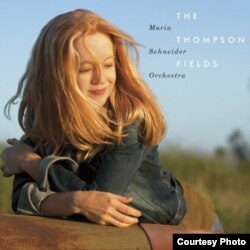Maria Schneider's big band has remained together nearly 25 years, extending into the 21st century the orchestral jazz tradition exemplified by Duke Ellington and her mentor Gil Evans. "The Thompson Fields" is her first new jazz orchestra recording in eight years, and the result is a masterpiece likely to garner multiple Grammy nominations.
The CD opens with "Walking by Flashlight,'' an instrumental adaptation of a theme from her 2013 album, "Winter Morning Walks," with soprano Dawn Upshaw and a chamber orchestra that won three Grammys in classical categories. Scott Robinson's poignant alto clarinet evokes images of an early morning walk through a gently windswept prairie field inspired by a poem by Nebraskan Ted Kooser.
If Ellington's compositions reflected the heartbeat of urban America, Schneider's themes draw inspiration from the landscapes, flora and fauna of rural America, particularly the open prairies near her childhood home in southwestern Minnesota.
The title track, inspired by the view of swaying bean fields from the silo of a neighbor's farm, opens with a soothing, restrained, Americana-style lullaby played by guitarist Lage Lund and pianist Frank Kimbrough, with the woodwinds and brass gradually blending in to provide a lush texture.
"The Monarch and the Milkweed," a reflection on the symbiotic relationship between the migrating monarch butterfly and the prairie plant where it lays its eggs, finds Marshall Gilkes' trombone and Greg Gisbert's flugelhorn dancing around each other and eventually crossing paths. "Nimbus" evokes the drama of an ominous cloud approaching in the Midwestern sky, with Steve Wilson's alto sax blowing up a storm.
As an arranger, Schneider takes after Evans by using unusual instrumental combinations to create a more colorful orchestral palette. Gary Versace's accordion, an instrument rarely heard in jazz big bands, is prominently featured on several tracks, most notably "A Potter's Song," a tender elegy for the late trumpeter Laurie Frink, a long-time band member.
The orchestra unleashes its full powers on "Arbiters of Evolution," reflecting Schneider's passion for ornithology, as saxophonists Donny McCaslin and Scott Robinson trade spectacular solos emulating the preening mating rituals of New Guinea's birds of paradise. "Lembranca" (Remembrance), dedicated to the late Brazilian composer Paulo Moura, begins softly and then takes flight, driven by drummer Clarence Penn and guest Brazilian percussionist Rogerio Boccato.
Schneider's lovely themes are immediately accessible, but this is also music whose intricate arrangements reveal new discoveries on repeated listening.





